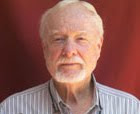WILL DAVID IRVING BETRAY HIMSELF, AND US?
Irving is, in fact, guilty of breaking Austrian law. He did “deny” the Holocaust, to use the usual jargon. His lawyer, Elmar Kresbach, tells the Guardian on 26 November: “There are the transcripts of his speeches, there is a newspaper interview that he gave [in 1989]. It’s pretty black and white.”
“But Irving told me that he has changed his views after researching in the Russian archives in the 1990s. He said, ‘I’ve repented. I’ve no intention of repeating these views. That would be historically stupid and I’m not a stupid man.’
“He said, ‘I fully accept this, it’s a fact. The discussion on Auschwitz, the gas chambers and the Holocaust is finished ... it’s useless to dispute it’.”
So the news—and this is only news—is that David Irving is going to recant his “revisionist” views on the Holocaust story. Who would have thought?
Irving is an absolutely unique individual. His capacity for work, his genius for organization, the quality of his intellect, his learning, his endless energy, his physical strength, his unwillingness to suffer fools and his easy willingness to offend friends, his daring—I have never met anyone to match him. No one.
At the same time, among we lesser folk, we have watched David Irving make one mistake after another. It began with his unwillingness to take on the Holocaust Industry straight on by setting aside his life-long interest in Hitler’s inside circle and do a real book on Auschwitz, the book he better than anyone else anywhere was capable of producing and promoting, I wish I could get inside his brain on that one, but it isn’t going to happen.
Then there was the stupidly conceived libel suit against Deborah Lipstadt, where during the trial he was brilliant and wrong-headed and utterly full of himself. Irving’s defeat at that trial was the most serious single blow that revisionism has ever received. Only last week a correspondent reminded me that it was the Lipstadt trial that convinced serious people that, okay, revisionists had taken an interesting run at the Holocaust story, they had failed in full view of the Western world, and there was no reason to worry about Holocaust revisionism any longer.
And of course his uniquely self-punishing interviews with the press that were comic and self-demeaning at the same time. What an interesting ride this man has had.
And now? If we are to believe his lawyer, who sounds like a practical man, David Irving is going to recant his views with regard to Auschwitz, the gas chambers, and who knows what else? He may. He may not. It would not be beyond him. This is a man for whom there is nothing “beyond.” But I feel a betrayal in the works. I hesitate to say it, but betrayal is in the air. My hope? That he recants to the Austrian court, is freed, and when he is out in the world again that he stands up in public to declare:
“I lied before a corrupt court. There is no honor in telling a corrupt court the truth if you do not enjoy being punished at the hands of corrupt law. The Auschwitz story is crap. I know it, and millions of people all over the Western and Muslim worlds know it. When I said ‘Auschwitz is a sinking ship,’ I was right. I meant it then, and I mean it now.”
Will David Irving betray himself then? And us? Or has David discovered evidence that supports the gas chamber stories and kept it secret from us and everyone else all these years? We are not going to know until he is a free man.

